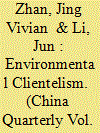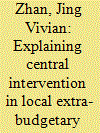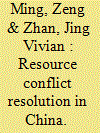|
|
|
Sort Order |
|
|
|
Items / Page
|
|
|
|
|
|
|
| Srl | Item |
| 1 |
ID:
180450


|
|
|
|
|
| Summary/Abstract |
Cross-national opinion surveys reveal that the Chinese regime enjoys perplexingly high levels of political trust when compared internationally. However, by tracing multiple surveys over time, this study finds that trust in the Chinese central government has declined notably since the early 2000s. We identify rising public criticism of income inequality as an underlying cause for the declining political trust during the surveyed period. We propose the concept of authoritarian critical citizens to understand the impact of citizens’ evaluation of specific government performance on diffuse support in authoritarian contexts. Whereas in democracies the rise of critical citizens may not undermine regime support, we argue that the rise of authoritarian critical citizens poses serious challenges to the Chinese party-state because the decline of specific support erodes the legitimacy and support of authoritarian regimes.
|
|
|
|
|
|
|
|
|
|
|
|
|
|
|
|
| 2 |
ID:
088460


|
|
|
|
|
| Publication |
2009.
|
| Summary/Abstract |
China's post-Mao reforms have devolved significant economic and fiscal power from central to local governments. However, decentralization from above involves political risks: weakened central control and increased local discretion may allow local governments to engage in self-interested activities with negative externalities to other regions and even the whole nation. A crucial question thus arises: how can the national government enjoy the benefits of decentralization while at the same time keeping the undesirable local behaviors in check? Through analysis of China's fiscal reforms, this paper suggests that the institutional advantageous position of the central government and its shrewd bargaining strategies played an important role in helping the central government maintain control over the fiscal system, inducing mutually acceptable outcomes for both the center and localities.
|
|
|
|
|
|
|
|
|
|
|
|
|
|
|
|
| 3 |
ID:
192627


|
|
|
|
|
| Summary/Abstract |
China's environmental crackdowns under Xi Jinping have led to a sweeping shutdown of private enterprises. To circumvent this, enterprises have developed different survival strategies including direct lobbying to government officials and indirect lobbying through business associations. Based on comparative case studies of environmental lobbying in Chinese cities, our research finds that larger enterprises, enjoying more economic leverage, tend to lobby directly using their own political connections to sway environmental enforcement. By contrast, smaller enterprises are excluded from these clientelist networks and have to lobby through business associations, the effectiveness of which hinges on the support of large enterprises. Therefore, we argue that although the Chinese government's increasingly stringent environmental policies have shrunk the lobbying (and living) space for private enterprises, the existence of environmental clientelism protects economically powerful and politically connected private enterprises but sacrifices the others in the implementation of environmental policies.
|
|
|
|
|
|
|
|
|
|
|
|
|
|
|
|
| 4 |
ID:
105223


|
|
|
|
|
| Publication |
2011.
|
| Summary/Abstract |
Chinese local governments widely resort to extra-budgetary exaction to finance themselves, which generates side effects that necessitate central intervention. Through statistical analysis, this paper finds that the central government intervenes only selectively, following a logic driven by economic development and political stability.
|
|
|
|
|
|
|
|
|
|
|
|
|
|
|
|
| 5 |
ID:
104363


|
|
|
| 6 |
ID:
189111


|
|
|
|
|
| Summary/Abstract |
With China’s continuous rise and growing external commercial, strategic, and political endeavours, questions have arisen about the motivation, timing, and locale of China’s outreaching strategies. This research analyzes China’s overseas port investments through a comparative study of Greece and Pakistan, two important partners of China’s Belt and Road Initiative. Adopting the neoclassical realist framework and drawing on expert interviews, official statistics, and policy documents, this paper reveals how China’s economic security objectives in combination with changing geopolitical structures led to its external port investments. This research contributes to the studies on rising powers and geopolitics by showing how China as a rising power capitalizes on geopolitical opportunities created by the changing interests of dominant powers to expand its presence in strategically important regions.
|
|
|
|
|
|
|
|
|
|
|
|
|
|
|
|
| 7 |
ID:
119195


|
|
|
|
|
| Publication |
2013.
|
| Summary/Abstract |
This article compares two neighbouring underdeveloped counties in south-west China. They share many similarities in economic, political and demographic structures, but experience divergent levels of social instability. The comparison suggests that, under China's political system and cadre incentive structure, the endowment of mineral resources in one county, and the lack thereof in the other, significantly influences the modes of economic development and local governance in these two counties, and thus contributes to their different levels of social instability.
|
|
|
|
|
|
|
|
|
|
|
|
|
|
|
|
| 8 |
ID:
183233


|
|
|
|
|
| Summary/Abstract |
It is widely assumed that authoritarian states tend to use repression to suffocate social conflicts that threaten regime stability. Focusing on the Chinese state's responses to resource conflict, a particular type of social conflict triggered by mineral resource extraction, this research argues that authoritarian regimes may prefer to use redistributive policies to defuse social unrest under certain circumstances. Through mixed methods combining qualitative research and statistical analysis, I find that local governments in resource-rich regions do not spend heavily on coercive state apparatus. Instead, they generously hand out social security benefits to appease aggrieved citizens. Furthermore, the Chinese state actively involves mining companies in the redistribution process and requires them to share the financial costs of relief policies. Therefore, when conflicts arise between specific social groups with conflicting interests, redistribution may be a more effective strategy to preserve regime stability.
|
|
|
|
|
|
|
|
|
|
|
|
|
|
|
|
| 9 |
ID:
153354


|
|
|
|
|
| Summary/Abstract |
Mineral resource extraction has frequently caused social tensions in China. This research examines the reactive and pre-emptive strategies used by the Chinese state to cope with resource conflicts. Based on extensive fieldwork in multiple mining areas, we find that the Chinese local state actively mediates between the mining sector and local citizens, and skilfully suppresses collective protests. More importantly, it pre-emptively intervenes in dispute-prone processes and redistributes resource wealth to create vested interests and mitigate popular grievances. We argue that the active state intervention in resource conflicts in China is driven by the party-state's tight control of local officials, which prevents local capture by resource interests, and enabled by the party-state's deep reach into society, which allows grassroots governments to negotiate between conflicting interests and mobilize resources towards conflict resolution.
|
|
|
|
|
|
|
|
|
|
|
|
|
|
|
|
| 10 |
ID:
139545


|
|
|
|
|
| Summary/Abstract |
Countries endowed with rich natural resources such as fuels and minerals often fall behind in human development. Does resource endowment hamper human capital development in China, a country that hosts rich resources in many of its regions? Through cross-regional and longitudinal statistical analysis and field research in selected mining areas, this study finds that resource dependence reduces government expenditure on human capital-enhancing public goods including education and health care. The local economic structure and reduced demand for labour, the shifting of government responsibilities onto mining enterprises, and the myopia of local residents and officials all discourage the local governments in resource-rich regions from investing in human capital.
|
|
|
|
|
|
|
|
|
|
|
|
|
|
|
|
| 11 |
ID:
123958


|
|
|
|
|
| Publication |
2013.
|
| Summary/Abstract |
Since the early 1980s, Chinese local governments have collected a significant amount of revenue outside the budgetary system. Fiscal shortage is commonly cited as the main reason for local extra-budgetary finance. However, a panel data analysis on provincial extra-budgetary practices reveals a different story. The findings suggest that extra-budgetary finance exists in China not as a strategy for local fiscal survival, but rather because local bureaucracies can conveniently exploit their administrative power to extract revenue from the local economy, and that extra-budgetary exactions fall disproportionately on peasants. Despite the constant calls by the central government to reform and regulate the extra-budgetary system, the centrally issued administrative directives have little impact on local practices.
|
|
|
|
|
|
|
|
|
|
|
|
|
|
|
|
|
|
|
|
|